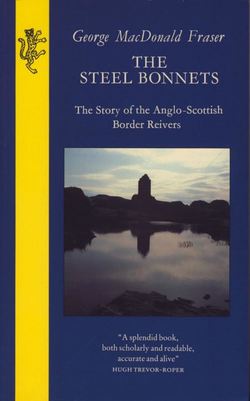Читать книгу The Steel Bonnets - George Fraser MacDonald - Страница 18
IX Bangtail and company
ОглавлениеThe Borderers were unusual in so many things that it is not surprising to find that they had their own peculiar customs in the matter of forenames and nick-names, which fell into several categories.
The first, and most confusing of these, arose from the frequency with which men of the same clan and surname also bore the same Christian name—one index to the Calendar of Border Papers, for example, contains no fewer than twelve Hob Elliots, and there is an abundance of Jock Armstrongs, Walter Scotts, Richard Grahams, Andrew Forsters, and so on. It was necessary to distinguish them, and one method was to combine their Christian name with that of their father: thus Christie Armstrong the son of William Armstrong was Will’s Christie, while Christie Armstrong the son of Simon Armstrong was Sim’s Christie. This was sometimes carried on to a third generation, so that there were Gibb’s Geordie’s Francis, Dick’s Davie’s Davie, and Patie’s Geordie’s Johnnie. Occasionally the mother was cited, as in Bessie’s Andrew and Peggie’s Wattie.
A second method was to call a man by his place or land: Kinmont Willie, Lancie Whithaugh, Hob of the Leys, Jock of the Side, Jock of the Park, etc., or by his rank—Sim the Laird, for example. By a combination of the two methods we get Whithaugh’s Andy, the Laird’s Jock, Kinmont’s Jock, Hob the clerk’s brother, and the like.
All too often contemporary documents dispensed with surnames altogether, and since Armstrongs called the Laird’s Jock or Rynion’s Archie had a habit of cropping up generation after generation, the task of sorting them out becomes complicated. This happens well up the social scale, too, and it is sometimes difficult to distinguish the various Kerr family leaders, since they are almost invariably referred to not by their given names, but by their estates. One Cessford can look very like another, and the same is true of the great breed of Ferniehurst.
But the most interesting nick-names, and the ones in which the Borderers obviously took great pleasure, were those descriptive and often highly offensive appellations referring to personal appearance, habits, and behaviour. Thus we find Curst Eckie, Ill Will Armstrong, Fingerless Will Nixon, Nebless Clem Croser, the two Elliot brothers, Archie and George, who were familarly known as “Dog pyntle” and “Buggerback”, and an Armstrong called “Skinabake”. Names like these last three probably owe themselves to nothing more than the Borderers’ delight in thinking up irrelevant and poetic obscenities to attach to each other; Border children still bandy them about with disarming fluency.
On the other hand, one can guess how David Armstrong came to be known as “Bangtail”. Exploits of a sterner kind are commemorated in names like Ill-drowned Geordie, Archie Fire-the-Braes, Out-with-the-sword, Gav-yt-hem, Crack-spear, and Cleave-the-crune. These explain themselves, but one wonders how a reiver came to be known as Laird-give-me-little, or As-it-luiks, or Hen-harrow, or why the nickname Sweet-milk was so popular.1
Robert Bruce Armstrong, the Liddesdale historian, had a fine collection of these names, many of them given above, and one cannot do better than this representative selection:
Hob the king, Dand the man, Gib alangsyde, Hob-wait-about-him, Red Cloak, Unhappy Anthone, Sow-tail, Ower-the-moss, Lang Will, Red Rowan, Wantoun Sim, David-no-gude-priest, Evilwillit Sandie, Shag, Bull, Lamb, Mouse, Sore John and Wynking Will.
If we knew how they came to be awarded we would know more of the Borders than we can ever discover from conventional histories.
1. There is a striking resemblance between some of these names and those of Red Indians like Alligator-Stands-Up, Thunder-Rolling-over-the-Mountain, and Crazy Horse. Many of these meant the opposite of what they appeared to mean—e.g. Man-Afraid-of-his-Horses, far from being a term of contempt, meant literally a man so formidable that even the sound of his horses terrified his enemies. Probably some of the Border names above have the same kind of hidden meaning.
